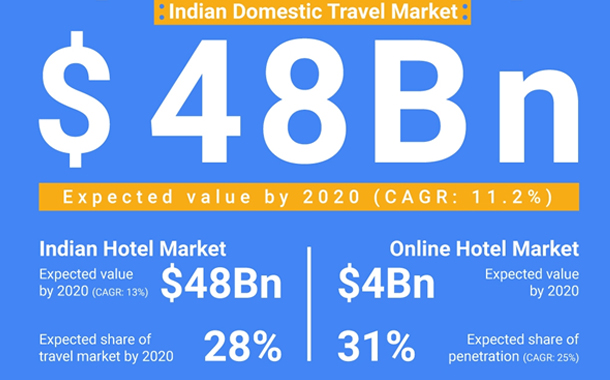Fuelled by domestic demand, hospitality will be $13 billion, with online hotels becoming a $4 billion market
Google India, along with Boston Consulting Group (BCG), today released a comprehensive report on the growth opportunities in the Indian hospitality market over the next four years. The report titled, ‘Demystifying the Indian Online Traveler’ charts the decision making journey of the Indian traveller and provides insights on the potential growth opportunities for travel businesses till 2020.
As per the report, Indian travel market is projected to grow at 11-11.5% to $48 billion by 2020 with the biggest contributor, air travel expected to grow at 15% to $30 billion. Hotels will grow at 13% to $13 billion by 2020 while railways will remain largely stagnant at $5 billion. Additionally, as more people come online, smartphone penetration improves and use of digital payments goes up, the report estimates that India’s online hotel market will grow to US$4 billion with 31% penetration at a CAGR of 25%.
Speaking about the key findings of the report, Vikas Agnihotri, Industry Director, Google India said; “India’s domestic travel market is on an acceleration path. One of the key findings of the report is that by 2020, one in three hotel rooms will be booked online – a clear indicator of the growing importance of digital in travel research, planning and booking. There are several actionable insights for domestic online travel players including the role of mobile and the level of curation and personalization that Indian travelers are looking for.”
Demystifying the travel planning journey of the typical Indian consumer, the report shows that for a majority of Indian consumers a vacation is a well thought through event, the planning for which starts several weeks in advance. On average, travel consumers spend 49 minutes spread over 46 days, visiting as many as 17 different online touch points to plan, research and make a booking. However, it is interesting to note that the length of each online session is less than 3 minutes, due to the ubiquity of mobile. Through their journey, Indian travelers tend to flip back and forth across different online destinations, checking availability and comparing prices across different providers and connectivity.
Talking about the opportunities for the online travel players, Abheek Singhi, Senior Partner and Asia Pacific Head of Consumer Practice, BCG said, “Travel is a high investment – both monetary and emotional – category. Technology has led to democratization of travel through better information and price discovery – and shall lead to 11-11.5% growth in years ahead. The question is “ how to address the 17 different touchpoints of three minutes each over 49 days!”
The imperative for players is to use technology and advanced analytics capability to understand individual micro journeys and offer personalized and curated travel solutions.” Highlighting the purchase drivers, the report finds that there are several touch points in the consumer journey, including OTA (64% reach), search engines (33% reach) and Maps (26% reach). Advocacy and word of mouth form an important input into the travel booking journey with 76% of people gaining inspiration to travel from family and friends. Further, reviews and ratings from other users is the single most important criteria to select a certain booking channel. Finally, the research finds that consumers use a mix of online and offline sources of information during their booking journeys. However, only 12% of the consumers prefer to use offline sources for research. 57% of the consumers believe that online channels give them better deals while 41% find it more convenient for them to book online.


